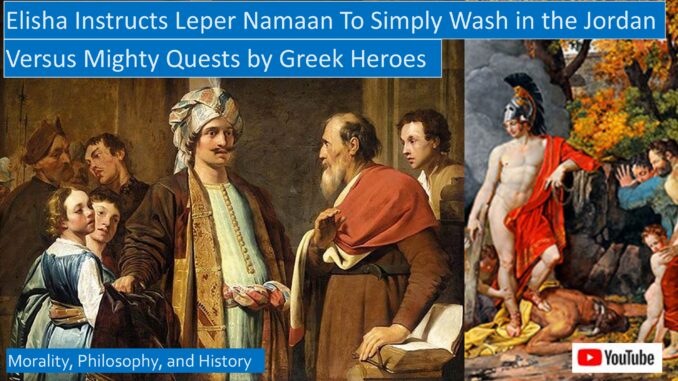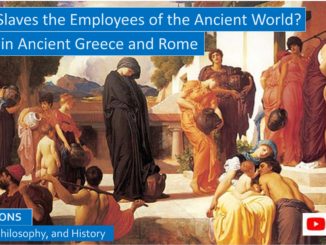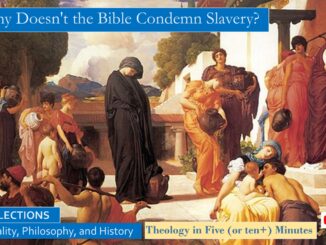
One of my favorite stories in the Bible is when Naaman the Syrian general, mortal enemy of Israel, was healed of his leprosy by the Israeli prophet Elisha. Naaman, in the story, is not asked to perform mighty deeds by Elisha, as befits an ancient warrior and hero, but rather to perform the rather simple task of washing in the shallow, muddy Jordan River so he could be cure of his leprosy.
Ancient readers living in their ancient warrior culture would pick up on this contrast immediately, but modern readers often totally miss it. Which makes this one of my favorite stories, since one of the themes of this channel is that, when interpreting the Old Testament stories, you must always remember that most ancient peoples lived in a warrior culture much like that of the Iliad, where life was uncertain, when armies could appear over the horizon, slaughter all the men of military age, and enslave the women and children.
YouTube video for the Iliad: https://youtu.be/ynIx-AVI2f8
YouTube video for this blog: https://youtu.be/-CDyTFW4KkM
YouTube script with book links: https://www.slideshare.net/BruceStrom1/elisha-cures-naaman-the-syrian-of-leprosy-not-with-mighty-deeds-but-by-simply-washing-in-the-jordan
The story of Elisha healing Naaman of his leprosy is referenced in the New Testament:
Jesus reminds us in Luke, “There were also many lepers in Israel in the time of the prophet Elisha, and none of them was cleansed except Naaman the Syrian.”[1]
We read about Naaman in 2 Kings: “Naaman, commander of the army of the king of Aram, was a great man and in high favor with his master, because by him the Lord had given victory to Aram. The man, though a mighty warrior, suffered from leprosy.”
The Scripture explicitly tell us Naaman was a mighty warrior, though humbled by a disfiguring skin condition. I remember I went to high school with a girl with a skin condition, even with modern medicine there was little that could be one, and as you could expect, she looked worser the older she aged, never marrying, never having a profitable career.
We read further in 2 Kings, “Now the Arameans, on one of their raids, had taken a young girl captive from the land of Israel, and she served Naaman’s wife.”
This young slave girl from Israel was very fortunate indeed, most pretty young girls captured in war were forced to be concubines of their conquerors, we are reminded of this cruel fact in the Iliad and in the Torah. And the Iliad is about how warriors are fighting over their concubines.
We read further in 2 Kings, “This young girl said to her mistress, ‘If only my lord were with the prophet who is in Samaria! He would cure him of his leprosy.’”[2]
This young girl was fortunate to be a beloved household slave, often these slaves, though still slaves, were treated as part of the family, particularly if the family owned just a few slaves.
So Naaman tells this to the King of Aram, archenemy of Israel, and he writes a letter, and Naaman goes to the King of Israel with this letter of introduction, with many talents of silver, and many shekels of silver, and many fine garments to the King of Israel, and we read:
We read in 2 Kings, “When the king of Israel read the letter, he tore his clothes and said, ‘Am I God, to give death or life, that this man sends word to me to cure a man of his leprosy? Just look and see how he is trying to pick a quarrel with me.’”
But Elisha knows what is happening. “When Elisha the man of God heard that the king of Israel had torn his clothes, he sent a message to the king, “Why have you torn your clothes? Let him come to me, that he may learn that there is a prophet in Israel.” So Naaman came with his horses and chariots and halted at the entrance of Elisha’s house. Elisha sent a messenger to him, saying, “Go, wash in the Jordan seven times, and your flesh shall be restored, and you shall be clean.” [3]
The commentator John Gray says that “Naaman drives up in his chariot to Elisha’s house, which we gather not to be the seemly approach to a prophet.” Which may not be so, isn’t that what mighty warriors always do? After all, chariots were the taxicabs of the Iliad, transporting our heroes to the frontlines of the battle.
The paintings always show Naaman speaking with Elisha, but the Scriptures say that Elisha did not come out to meet Naaman, and the story does imply that Naaman was insulted by this gesture.
Why wouldn’t Elisha come out and meet Naaman? John Gray comments, “Elisha’s response is to stand on his own dignity and send a messenger to deal with Naaman. This was a somewhat exacting test of the faith of Naaman, and from the brusqueness of the prophet’s reply,” “Naaman might well be excused for taking it as a studied insult.”[4]
St Ephrem has a more practical explanation, that as the opposing general Naaman had “killed many children of Israel, and had destroyed their lands, so his hands were stained with innocent blood,” and because Jewish “Law prescribed that no leper could be approached or touched.”[5] But yet, Elisha was willing to heal even this great enemy of Israel.
2 Kings continues, “But Naaman became angry and went away, saying, ‘I thought that for me he would surely come out, and stand and call on the name of the Lord his God, and would wave his hand over the spot, and cure the leprosy! Are not’ ‘the rivers of Damascus, better than all the waters of Israel? Could I not wash in them, and be clean?’ He turned and went away in a rage.” [6]
Not only would Elisha not come out to see Naaman, but he also refused to perform some mighty sign that all proper prophets do, like when Moses beat the rock so water would flow out of it, a miracle also performed by St Clement when imprisoned in the mines by the Black Sea.
Many times have I heard preachers preach about the story of Naaman, and they totally miss the point of how the mighty deeds of the ancient Greek heroes compare with the humble deed of washing in the Jordan.
The pagan stories of mighty heroes known to Naaman have been lost in the sands of history, but we do know of many similar stories from ancient Greece. Our first example of mighty deeds performed by Greek heroes are the many mighty quests performed by Theseus, first King of a united Athens, who performs many mighty deeds, including slaying the mighty Minotaur, the monster with the head of a bull on the body of a burly man.
In Plutarch’s Life of Theseus, he learns that the ancient Athenians owed Minos, the King of Crete, a ransom of seven young men and seven virgins to be fed to the Minotaur, a ferocious half-man, half-bull beast, a half man with the head of a bull, who lived in the maze below the palace. The young men and virgins of Athens drew lots, but Theseus volunteered without drawing a lot, and all Athens “were struck with admiration for the nobleness and with love for the goodness of the act.”
Plutarch does not tell us how the daughter of the King of Crete falls in love with Theseus, evidently princesses just cannot resist this hunk of a hero, and Theseus, having arrived at Crete, “having a thread given him by Ariadne, who had fallen in love with him, and being instructed by her how to use it so as to conduct himself through the windings of the labyrinth.”
“Theseus escaped out of it and slew the Minotaur, and sailed back, taking along with him Ariadne and the young Athenian captives.”
But soon after Theseus abandons Ariadne, as he does most every woman in his life, and Plutarch’s Life of Theseus tells the story of the many women in his life, and how he is faithful to none of them, a hero of the worst kind, a hero who only cares for himself. But Ariadne gets a better match, as she marries the Greek god Dionysius. [7]
And we remember the many mighty deeds of Odysseus, performed before he can complete his decade long journey back to the arms of his wife, the beloved Penelope, from the walls of Troy. Odysseus’ first great adventure is when he and his men are trapped in the cave of the one-eye Cyclops monster, who eats his men one at a time for dinner. They get him drunk, drive a burning stake in his eye, and sneak out tied to the bottom of his sheep. When they escape to their boat, the Cyclops tries to sink their boat by hurling boulders, but he misses, since he can only hear them, he cannot see them.
Odysseus and his crew must sail to Hades, because all Greek heroes are bidden to make the obligatory trip to the Underworld, but they must first sail past the Sirens. Odysseus is instructed, “Therefore, sail on, and stop your comrades’ ears with sweet wax kneaded soft, that none of the rest may hear.” Of course, the bad boy hero Odysseus instructs his crew to tie him to the mast, so he can be tempted by the seducing songs of the Sirens as they seek to lure him to his death.
Homer sings, “In the Underworld, the ghost of Tiresias prophesies to Odysseus, ‘On the island of Thrinacia feed the many cattle and sturdy flocks of the Sun God.’ ‘Of them, no young are born, nor do they ever die.’ If you leave them unharmed, you will still reach Ithaca, though you shall see many hardships. But if you harm the cattle, then I predict the loss of ship and crew, and even if you yourself escape, late shall you return home with many troubles, without your crew.”
Predictably, the crew eat the immortal cattle and die, so Odysseus alone reaches his home in Ithaca, but not before sorceresses and goddesses force him to be their lovers for several years, before the gods compel them to let Odysseus go.[8]
We also have the story of Heracles, known to the Romans as Hercules, who is also compelled to sleep with sorceresses. Hercules is a mortal son of Zeus, or Jupiter, since his mother is mortal. One mighty task accomplished by Hercules is freeing Prometheus, who the gods kept in chains for stealing fire from the gods, giving it to men. Hercules performed other mighty deeds, in these paintings he slayed the hydra monster and the centaurs.
We also have the story of Heracles, known to the Romans as Hercules, who is also compelled to sleep with sorceresses, but is a mortal, son of Zeus, or Jupiter, and a mortal woman. One mighty task is freeing Prometheus, who the gods chained for stealing fire from the gods, giving it to men. Hercules performed other mighty deeds, in these paintings he slayed the hydra monster and the centaurs.[9]
Some early Christians were sympathetic to the figure of Hercules, we reflected on a work by St Justin Martyr where he repeated the story told by Xenophon on the lessons learned by the Stoic hero Hercules as he encounters Ladies Virtue and Vice.
Perhaps the ancient warrior Naaman the Syrian was expecting to be assigned a noble task to perform rather than the simple task of washing seven times in the muddy, shallow Jordan River. We also know that many Greek heroes who were bidden to perform mighty deeds were flawed characters, sometimes with deeply flawed morals.
We read in 2 Kings that Naaman’s servants approached and said to him, “Father, if the prophet had commanded you to do something difficult, would you not have done it? How much more, when all he said to you was, ‘Wash, and be clean’?”[10]
Another astounding detail in the story most preachers miss is how remarkable it is that his slaves would challenge their master, especially since their master was a general, one of the most powerful men in their kingdom, and that this powerful general would listen to the criticisms of his slaves. This implies that Naaman, though he had Jewish blood on his hands, was also a good man, who showed compassion to his slaves.
We read in 2 Kings, “So Naaman went down and immersed himself seven times in the Jordan, according to the word of the man of God; his flesh was restored like the flesh of a young boy, and he was clean.”[11]
Most commentators and scholars agree, the disease of leprosy in the Bible not only includes the disease of leprosy, but any serious skin condition. But St Ephrem the Syrian seeks a spiritual definition: “Sin is the leprosy of the soul, which is not perceived by the senses, but intelligence has the proof of it, and human nature must be delivered from this disease by Christ’s power which is hidden in Baptism. It was necessary that Naaman, in order to be purified from two diseases, that of the soul and that of the body, might represent in his own person the purification of all the nations through the bath of regeneration, whose beginning was in the River Jordan, the mother and originator of baptism.”[12]
Caesarius of Arles sees this washing of Naaman in the Jordan as a foreshadowing of Christ’s baptism in the Jordan: “Elisha sent Naaman to the river Jordan because Christ was to send the Gentiles to baptism. Just as Elisha did not touch Naaman himself or baptize him showed that Christ did not come to the Gentiles Himself but through his apostles.” “Naaman, who prefigured the Gentiles, recovered his health in the same river that later Christ consecrated by His baptism.”[13]
Naaman had brought with him much gold and silver and other costly presents, that was how you supported the prophets and temples in the ancient world, and if you were generous to the gods, perhaps the gods would bless you in return, healing your ailments, sending propitious omens your way, and issuing beneficial oracles when you face difficult decisions.
But Elisha refused to accept these gifts, as the God of Israel heals without needing gifts. But his servant Gehazi had second thoughts, later he caught up with Naaman, and announced that the prophet had changed his mind![14]
St Ephrem teaches us that “after Gehazi had returned from his meeting with Naaman,” “Elisha inquired purposefully, ‘Where do you come from?’” “If Gehazi had repented and swore, he would have been forgiven; but if he denied that he had secretly received money, the leprosy of Naaman would cover him conspicuously.”[15] Which, indeed, is what happened.
DISCUSSING THE SOURCES
The Ancient Christian Commentary on each of the books of the Bible is our favorite, they include commentary by both Eastern and Western Church Fathers. The Westminster series is one of the better historical critical commentaries, although they are out of print, you can pick up used copies inexpensively.
And, of course, we consulted Plutarch, although the Life of Lysander we found in the dreaded Dryden translation, also the excellent translation of the Odyssey.
[1] https://www.biblegateway.com/passage/?search=luke+4%3A27&version=NRSVCE
[2] https://www.biblegateway.com/passage/?search=2+kings+5%3A1-3&version=NRSVCE
[3] https://www.biblegateway.com/passage/?search=2+kings+5%3A4-10&version=NRSVCE
[4] John Gray, I & II Kings, The Old Testament Library (Philadelphia: Westminster Press, 1970, 1964), p. 506.
[5] St Ephrem, Ancient Christian Commentary on Scripture, Old Testament V (Downers Grove, Illinois: InterVarsity Press, 2008), II Kings 5:8-12, p. 167.
[6] https://www.biblegateway.com/passage/?search=2+kings+5%3A11-13&version=NRSVCE
[7] Plutarch, Plutarch’s Lives, Volume 1, Theseus, Dryden Translation (New York: The Modern Library, 2001, 1992, originally 100+ AD), pp. 1-23.
[8] Homer, “The Odyssey,” translated by George Herbert Palmer (New York: Barnes and Noble Classics, 2003), Books V-XII, pp. 57-157.
[9] https://en.wikipedia.org/wiki/Heracles
[10] https://www.biblegateway.com/passage/?search=2+kings+5%3A11-13&version=NRSVCE
[11] https://www.biblegateway.com/passage/?search=2+kings+5%3A14&version=NRSVCE
[12] St Ephrem, Ancient Christian Commentary on Scripture, Old Testament V, II Kings 5:8-12, p. 167.
[13] Caesarius of Arles, Ancient Christian Commentary on Scripture, Old Testament V, II Kings 5:8-12, pp. 168-169.
[14] https://www.biblegateway.com/passage/?search=2+kings+5%3A19-27&version=NRSVCE
[15] St Ephrem, Ancient Christian Commentary on Scripture, Old Testament V, II Kings 5:8-12, p. 170.




Be the first to comment